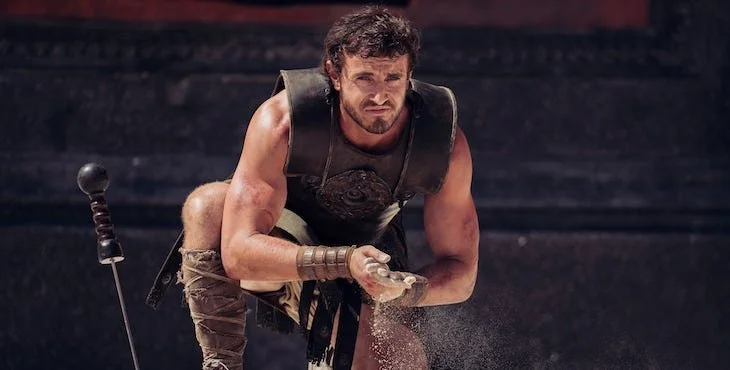‘Gladiator II’
Ridley Scott’s much anticipated Gladiator sequel delivers big time on the spectacle front but unfortunately falls short of the original film’s legacy.
As the world turned into a new millennium, Ridley Scott took audiences back to ancient Rome with Gladiator. The 2000 film was a huge success, grossing almost half a billion dollars world wide, at the time, and went on to win five Oscars; including Best Actor for Russel Crowe and the heralded Best Picture. 24 years later and after various attempts, the much anticipated Gladiator II is finally hitting the big screen.
Rising star, Paul Mescal (Normal People; Aftersun), leads Gladiator II as Lucius as the film takes audiences back to Rome where he finds the city under the rule of two tyrannical Emperors; Geta, portrayed by Joseph Quinn (Stranger Things) and Caracalla, portrayed by Fred Hechinger (The White Lotus).
In Rome, Lucius is forced to fight in the Colosseum as a Gladiator, under the ownership of Denzel Washington’s Macrinus. During his time within the Colosseum’s walls, Lucius fights in hopes of returning Rome to its former glory as he confronts his troubled past head on, fuelled by the growing rage inside him caused by the Roman Armies leader; Marcus Acacius, played by Pedro Pascal (The Mandalorian).
Whether through the annals of history or on the space rigs of the far distant future, Ridley Scott is no stranger to the creation of awe inspiring spectacle; and that spectacle is found at the forefront of Gladiator II. From its opening scene of Roman warfare, to its time spent in the Colosseum; whether it be hand to hand combat or naval battle, the film is constantly riveting in its spectacle.
Scott’s talent behind the camera stands out most during the film's 2 and a half hour run time. Sweeping vistas of a Rome on the cusp of collapse bookend the high intensity battle sequences, during which Scott buries the audience within the heart of their chaos with ease. Gladiators fight monkeys, dodge Rhino’s and try not to fall overboard into shark infested waters, all the while completely selling the situations they find themselves in.
Paul Mescal shines best in his role as Lucius when he brings a physicality to the film that audiences haven’t seen much of in his previous performances. Acting almost as a reincarnation of Russel Crowe’s Maximus, Mescal succeeds in Lucius’ action driven scenes. In the more dramatic moments of the film, however, Mescal doesn’t quite bring the weight for audiences to truly latch on to the journey at the film’s core.
This is true for the majority of the film's characters. Pedro Pascal is underused as the head that Lucius is hunting throughout the film, which results in a lack of power in the two’s conflict. Joseph Quinn and Fred Hechinger both go overly large in their performances as Rome’s two emperors, both of which tend to land more in a comedic territory rather than the unnerving one they seem to be aiming for.
However, Denzel Washington absolutely shines as Macrinus, the slave owner who delivers Lucius to the Colosseum. He brings a heightened energy that, unlike Quinn and Hechinger, purposefully invites audiences to lower their guard and relax around the character. Washington is firing on all cylinders and manages to stand out as a highlight of the film, even when its story starts crumbling around him.
It’s in the film’s story, from a screenplay by David Scarpa (Napoleon), that Gladiator II most comes undone. Initially operating as a mimic of its predecessor, the film tends to lack its own identity at times; and when it does do its own thing, it can feel a bit too shallow to truly connect with. Its underused characters and the emotional brevity found in its grander conflicts can at times have the film feeling dulled down, instead succeeding more in its intimate character conflicts and action driven sequences.
It does, however, see the return of Connie Nielsen, reprising her role as Lucilla who served as a key part of the original film as the mother of Lucius. Here, Lucilla and Lucius’ relationship serves as the key, emotional core of the film as we find their connection strained through time, severing their fondness of one another. It’s in this relationship and Lucius’ hunt for the head of Pascal’s Marcus that Gladiator II’s story is at its strongest, however it is undervalued next to the more grander conflict between Rome and its two Emperors.
This imbalance in emotional strength can become frustrating as the films intimate conflicts tend to carry more weight then their grand counterparts. Thankfully, Washington finds himself at the centre of this larger conflict and manages to make it worthwhile, as he is given plenty of real estate to truly ham it up as Macrinus. Unfortunately though, this aspect of the film's story does struggle to resonate with audiences and results in a climax that feels more like a trip than a landing.
However, Ridley Scott still manages to do enough to engage audiences through it all. Its larger tale can feel slight and disengaging, at times, but Paul Mescal and Denzel Washington have enough charisma to carry the film in its in between moments. It’s in the sheer spectacle and intensity of the Colosseum battles, of which there are a pleasant number, that Gladiator II really sings and for most audiences that will be exactly what they are looking for in this much anticipated sequel. It doesn’t necessarily build its own legacy, but it definitely does do enough to entertain.
Gladiator II is in Australian cinemas now!
